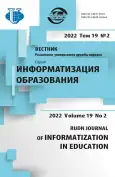Shift from traditional into interactive approach: teaching monologue with the use of information and communication technologies
- Authors: Rizakhojayeva G.A.1, Akeshova M.M.1
-
Affiliations:
- Khoja Akhmet Yassawi International Kazakh-Turkish University
- Issue: Vol 19, No 2 (2022)
- Pages: 135-145
- Section: EVOLUTION OF TEACHING AND LEARNING THROUGH TECHNOLOGY
- URL: https://journal-vniispk.ru/2312-8631/article/view/321314
- DOI: https://doi.org/10.22363/2312-8631-2022-19-2-135-145
- ID: 321314
Cite item
Full Text
Abstract
Problem and goal. In modern society, the fundamental priorities are both the continuous renewal and recreation of the language personality of students, and the necessary competencies and abilities for the practical application of what has been learned to solve urgent problems. The concept of the formation of a “secondary language personality” that currently exists in the methodology of foreign language education and training implies the unconditional presence of competencies, the key and most significant of which is communicative. The level of formation of communicative competence is determined by the presence of awareness in the perception of the socio-cultural portrait of the country of a foreign language; social, cultural and ethnic tolerance; speech etiquette and courtesy in communication; possibility of finding ways to resolve conflicts in communication. The above tasks take place to be implemented only if the educational process is created and maintained in the context of a dialogue of cultures. But it is impossible without the introduction of information and digital technologies into the educational process. The purpose of this study is to test the effectiveness and relevance of the application of various methods, techniques and exercises using information technology to develop students’ speech skills (in particular, monologue speech). Methodology. The pedagogical experiment consisted of four stages: the organization of the study, the implementation of the experiment, the identification of quantitative and qualitative characteristics of the results of experimental learning, the interpretation of the causes and factors influencing the results. Results. The performance of the experimental group is relatively higher than that of the control group. The explanation for these results can be the different degree of performance of groups, the level of motivation of students, as well as the technologies used in the learning process. The data of the study of the quality of monologue speech at the control stage (test-cut of the experimental group) compared with the indicators of the ascertaining stage increased by an average of 10% in all parameters. Conclusion. Results of the experimental and control groups prove that the quality of the classes, the introduction of innovative and information technologies, as well as the motivation of students play an important role in the process of teaching a foreign language.
Keywords
About the authors
Gulnara A. Rizakhojayeva
Khoja Akhmet Yassawi International Kazakh-Turkish University
Email: gulnara_rizahodja@mail.ru
ORCID iD: 0000-0002-6791-243X
PhD, Assistant Professor
29 B. Sattarkhanov Ave, Turkestan, 161201, Republic of KazakhstanMadina M. Akeshova
Khoja Akhmet Yassawi International Kazakh-Turkish University
Author for correspondence.
Email: madina_shakh@mail.ru
ORCID iD: 0000-0002-2264-4742
PhD, Assistant Professor
29 B. Sattarkhanov Ave, Turkestan, 161201, Republic of KazakhstanReferences
- Nambudiri R, Shaik R, Ghulyani S. Student personality and academic achievement: mediating role of psychological capital (PsyCap). International Journal of Educational Management. 2019;34:768-781.
- Shaffer K. Why we need a guide to new teaching methods now. Academic Radiology. 2019;26(1):114-115. https://doi.org/10.1016/j.acra.2018.09.020
- Williams M, Mercer S, Ryan S. Exploring psychology in language learning and teaching. Oxford University Press; 2016.
- Gardner D, Yung KWH. Learner motivation in self-access language learning. Innovation in Language learning and Teaching. 2017;11(2):159-176. https://doi.org/10.1080/17501229.2015.1088545
- Galimova EG, Shvetsova MG. Modern educational technologies in teaching senior secondary pupils’ communication in the form of a monologue and in generating their cognitive interest. International Journal of Environmental and Science Education. 2016; 11(8):1951-1962. https://doi.org/10.12973/ijese.2016.569a
- Van Dijk LA, Jochems WMG. Changing a traditional lecturing approach into an interactive approach: effects of interrupting the monologue in lectures. International Journal of Engineering Education. 2002;18(3):275-284.
- Ford K. The taped monologue as narrative technique for reflective practice. ELT Journal. 2016;70(3):253-260. https://doi.org/10.1093/elt/ccv079
- Goryacheva EN, Goryacheva IN. The role of digital technologies in the formation of communicative competence in teaching a second foreign language (Spanish) to bachelors in Economics and Finance. Modern Management Trends and the Digital Economy: from Regional Development to Global Economic Growth: 1st International Scientific Conference (MTDE 2019). Atlantis Press; 2019.
- Rizakhojayeva G, Yussupova G, Mamyrbayeva B, Meirbekov A. Professional foreign language training in the context of the digital university: example of modeling and experimental validation. International Journal of Engineering Pedagogy. 2021;11(6):50-69.
- Setyorini W, Hartono R. The effectiveness of digital and printed comics to teach monologue of visual and auditory students: a Case of the Tenth Year Students of State Senior High School 1 Ungaran. English Education Journal. 2017;7(1):73-78. https://doi.org/10.15294/EEJ.V7I1.14689
- Holubnycha LО. Intensification of students’ cognitive activity while forming skills of English monologue speech (experience exchange). Cherkasy University Bulletin: Pedagogical Sciences. 2018;(9):53-60.
- Oslick ME, Robertson T, Parks M. Creating spaces for critical conversations on issues of social justice. Using Nonfiction for Civic Engagement in Classrooms: Critical Approaches. Rowman & Littlefield Publishers, Inc.; 2018. p. 95-104.
- Bhatnagar M. Learning through information and communication technology. International Journal in Management & Social Science. 2016;4(4):206-212.
- Brown R. (ed.). Knowledge, education, and cultural change: papers in the sociology of education (vol. 3). Routledge; 2018.
- Suyarov A. Teaching reading: goals and techniques. Texas Journal of Multidisciplinary Studies. 2022;5:283-286.
Supplementary files









